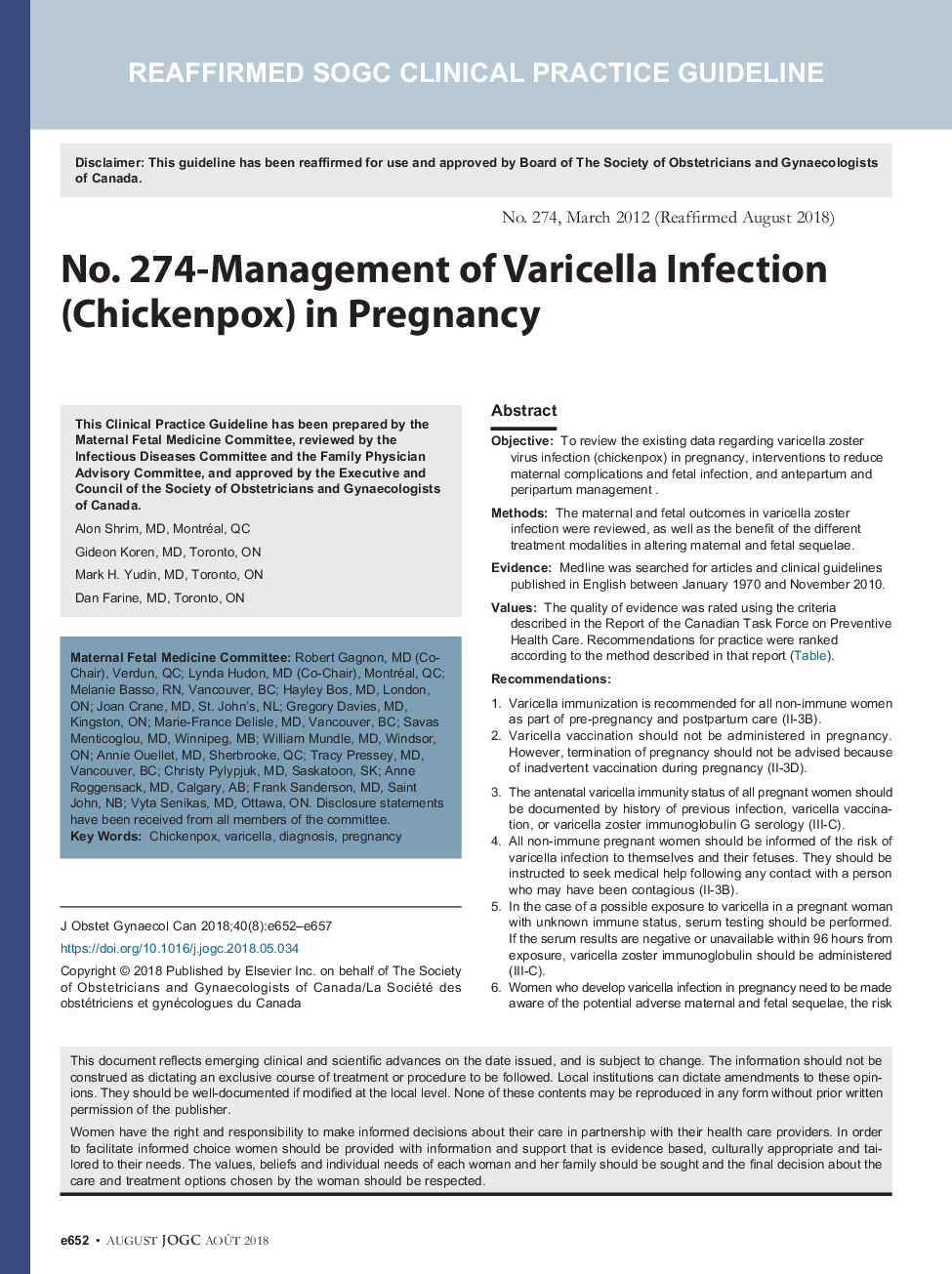| کد مقاله | کد نشریه | سال انتشار | مقاله انگلیسی | نسخه تمام متن |
|---|---|---|---|---|
| 8781518 | 1600642 | 2018 | 6 صفحه PDF | دانلود رایگان |
عنوان انگلیسی مقاله ISI
No. 274-Management of Varicella Infection (Chickenpox) in Pregnancy
ترجمه فارسی عنوان
شماره 274- مدیریت عفونت وریسلا (ران مرغ) در بارداری
دانلود مقاله + سفارش ترجمه
دانلود مقاله ISI انگلیسی
رایگان برای ایرانیان
کلمات کلیدی
موضوعات مرتبط
علوم پزشکی و سلامت
پزشکی و دندانپزشکی
زنان، زایمان و بهداشت زنان
چکیده انگلیسی
ObjectiveTo review the existing data regarding varicella zoster virus infection (chickenpox) in pregnancy, interventions to reduce maternal complications and fetal infection, and antepartum and peripartum management .MethodsThe maternal and fetal outcomes in varicella zoster infection were reviewed, as well as the benefit of the different treatment modalities in altering maternal and fetal sequelae.EvidenceMedline was searched for articles and clinical guidelines published in English between January 1970 and November 2010.ValuesThe quality of evidence was rated using the criteria described in the Report of the Canadian Task Force on Preventive Health Care. Recommendations for practice were ranked according to the method described in that report (Table).Recommendations1.Varicella immunization is recommended for all non-immune women as part of pre-pregnancy and postpartum care (II-3B).2.Varicella vaccination should not be administered in pregnancy. However, termination of pregnancy should not be advised because of inadvertent vaccination during pregnancy (II-3D).3.The antenatal varicella immunity status of all pregnant women should be documented by history of previous infection, varicella vaccination, or varicella zoster immunoglobulin G serology (III-C).4.All non-immune pregnant women should be informed of the risk of varicella infection to themselves and their fetuses. They should be instructed to seek medical help following any contact with a person who may have been contagious (II-3B).5.In the case of a possible exposure to varicella in a pregnant woman with unknown immune status, serum testing should be performed. If the serum results are negative or unavailable within 96 hours from exposure, varicella zoster immunoglobulin should be administered (III-C).6.Women who develop varicella infection in pregnancy need to be made aware of the potential adverse maternal and fetal sequelae, the risk of transmission to the fetus, and the options available for prenatal diagnosis (II-3C).7.Detailed ultrasound and appropriate follow-up is recommended for all women who develop varicella in pregnancy to screen for fetal consequences of infection (III-B).8.Women with significant (e.g., pneumonitis) varicella infection in pregnancy should be treated with oral antiviral agents (e.g., acyclovir 800âmg 5 times daily). In cases of progression to varicella pneumonitis, maternal admission to hospital should be seriously considered. Intravenous acyclovir can be considered for severe complications in pregnancy (oral forms have poor bioavailability). The dose is usually 10 to 15âmg/kg of BW or 500âmg/m2 IV every 8âh for 5 to 10 days for varicella pneumonitis, and it should be started within 24 to 72âh of the onset of rash (III-C).9.Neonatal health care providers should be informed of peripartum varicella exposure in order to optimize early neonatal care with varicella zoster immunoglobulin and immunization (III-C). Varicella zoster immunoglobulin should be administered to neonates whenever the onset of maternal disease is between 5 days before and 2 days after delivery (III-C).
ناشر
Database: Elsevier - ScienceDirect (ساینس دایرکت)
Journal: Journal of Obstetrics and Gynaecology Canada - Volume 40, Issue 8, August 2018, Pages e652-e657
Journal: Journal of Obstetrics and Gynaecology Canada - Volume 40, Issue 8, August 2018, Pages e652-e657
نویسندگان
Alon MD, Gideon MD, Mark H. MD, Dan MD,
